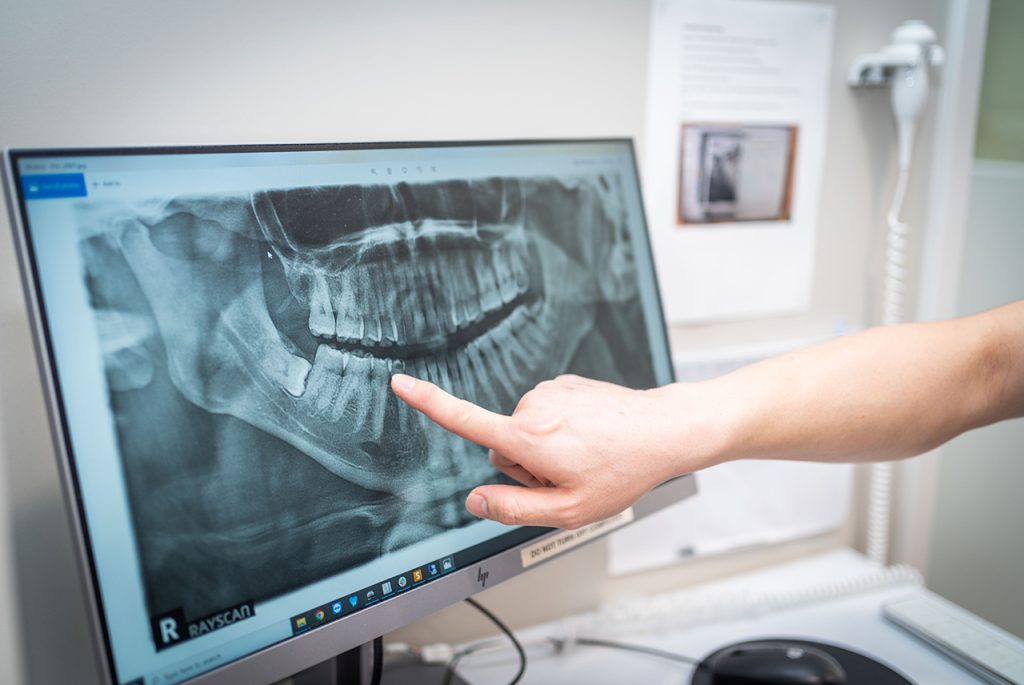
Wisdom Teeth & Extractions
As a rule, dentists generally prefer to save teeth where possible as there are no superior substitutes to one’s own natural teeth. However, there are times when maintaining a tooth may no longer be possible or is not beneficial to your overall oral health.
In these cases, dental extractions may be the only option to bring your mouth back to a healthy condition and to prevent issues such as severe pain, infections or damage to your surrounding teeth.
Wisdom teeth are the last molars (back teeth) in your mouth, typically emerging between the ages of 15 to 25 years. The average adult will have 4 of these teeth in total, although it is not uncommon to be missing one or more of them. Unfortunately, these teeth tend to get a bad reputation due to the various problems they may cause including:
- Dental cavities – due to difficulties in brushing these teeth.
- Gum issues – due to inflammation of the gums growing over them
- Damage to adjacent teeth – either due to difficulty cleaning or pressure resorption
- Trauma to the cheek – if a tooth is awkwardly placed
One of the most important steps after an extraction is replacing or substituting a missing tooth. [except for wisdom teeth]. Various problems that may otherwise occur includes:
- Overloading your remaining teeth – when a tooth is lost, a person tends to use the other side of their mouth to chew which ends up putting excessive stress on their remaining teeth. In time, this increases the risk of these teeth cracking or fracturing from overuse.
- Over-eruption and drifting – Teeth are not rigid and will move from their original position to drift into empty gaps when a tooth is lost. Teeth above an empty space may over-erupt, while teeth in front or behind may drift, causing spaces to open elsewhere.
- Increased decay risk – It is very common for tooth decay to develop in over-erupted teeth or on the teeth next to them due to difficulties with cleaning in the area.
FAQs
Can I be put to sleep to have my teeth out?
Typically, dental extractions of teeth are done in the chair through the application of local anaesthetics (the numbing of a tooth/teeth and the area around it). There are situations where additional levels of anaesthesia may be considered – such as more difficult extractions, taking out multiple teeth (especially multiple wisdom teeth) or even if you just feel particularly anxious about the procedure.
In these cases, sedation or general anaesthesia (GA) is possible depending on your needs and requirements. Your dentist may recommend the extraction to be done under sedation or refer you to a specialist surgeon (known as a maxillofacial surgeon) who routinely offers extractions under GA.
Read more under sleep dentistry.
Do I need to have some time off after having teeth taken out?
The symptoms you may experience vary depending on the difficulty of the extraction, your natural healing capabilities and the tooth being taken out. It typically takes a couple of days to recover from a simple extraction although with more difficult extractions or wisdom teeth, this may take longer, sometimes up to a week or two.
It is recommended that if you have never had a tooth out before, or if a dentist has advised that your case is particularly tricky, to be ready that an additional healing or rest period of a week or so may be required after.
Do teeth replacements need to be done right away or can I wait?
While teeth replacement don’t have to be done right away, they should be done sooner rather than later. Two major things occur after a tooth is taken out namely:
- Shrinkage of bone where a tooth is missing
- Movement, drifting and tilting off your other teeth into the gap
After a significant amount of time has passed, both these things contribute to making the replacement of a missing tooth much more difficult than what it would normally be.
Is it true that you ALWAYS have to have your wisdom teeth out?
Contrary to popular belief, wisdom teeth are not routinely removed; especially if they are fully functional teeth. The decision to remove a wisdom tooth depends on various factors such as your ability to keep the tooth/teeth clean, available space in your mouth, as well as how often the tooth itself gives you trouble. It is something your dentist can discuss further with you if you’re having trouble with them or when they start emerging.
Will I need stitches?
This varies from patient to patient and how complex the procedure was. Your dentist will make a judgement call depending on how the area is clotting after the procedure is done, or based on your medical history.
Note that sometimes, you will be asked to return in a week or two to have the stitches removed if they are placed.
